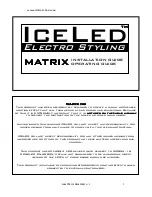
OPERATING INSTRUCTIONS
Operating Instructions for the Coolant Retention feature:
NEVER USE THIS TOOL ON ENGINES THAT ARE ABOVE 120°F
Allow engine to cool. Engine must not be running during this procedure.
Shop air pressure required:
Minimum 80 psi @ 12 cfm/maximum 150 psi reading. Use a 3/8”
airline, no more that 25’ in length, with suitable fittings on each end.
How it works:
The tool is designed to clear a pathway of air from where a component will be removed
to where the tool is attached to the cooling system. The shop air enters into the open port continuously,
preventing coolant from draining. The coolant in that area gets displaced by the incoming air and needs
a place to go. If the cooling system is completely filled and there is no space for the displaced coolant,
surging and/or draining though the open port can occur. To avoid this, we recommend removing some of
the coolant prior to using the tool. See Illustration 1 and 2 on the next page.
ATTACH TOOL TO COOLING SYSTEM
1. Install an air hose quick connect fitting that matches your shop air accessories.
2. The tool is designed to attach to the cooling system cap location. To install the tool the technician
must decide if the tool fits directly onto the coolant port or if an adaptor is required. Whichever
method is used it must provide a leak free connection.
3. Install exhaust hose and
OPEN THE EXHAUST VALVE
(handle in line with valve body - see illustration
#3)
4. Route the end of the exhaust hose into an open container (a 5 gallon bucket is ideal) leaving a coil,
if possible, at the bottom of the container to catch the small amount of coolant that may exhaust
with the air.
5. Before attaching air supply line,
CLOSE AIR INLET VALVE
(handle perpendicular to valve body). Install
shop air hose to the air inlet valve.
NOTE:
Replacement part should be ready for installation before removing defective part, minimizing the
time the system is open.
6. Once the tool is attached to the vehicle, clamp off the small lines leading from the expansion tank.
Open the air inlet valve (handle in line with the body).
7. Perform the vehicle maintenance that is required.
DO NOT LEAVE THE TOOL UNATTENDED
.
8. Close air inlet valve. Remove air hose.
9. Remove tool.
10. Check coolant fluid level. Top off coolant if necessary.
11. Install coolant cap. Either pressure test or run engine to check for leaks.
4





































